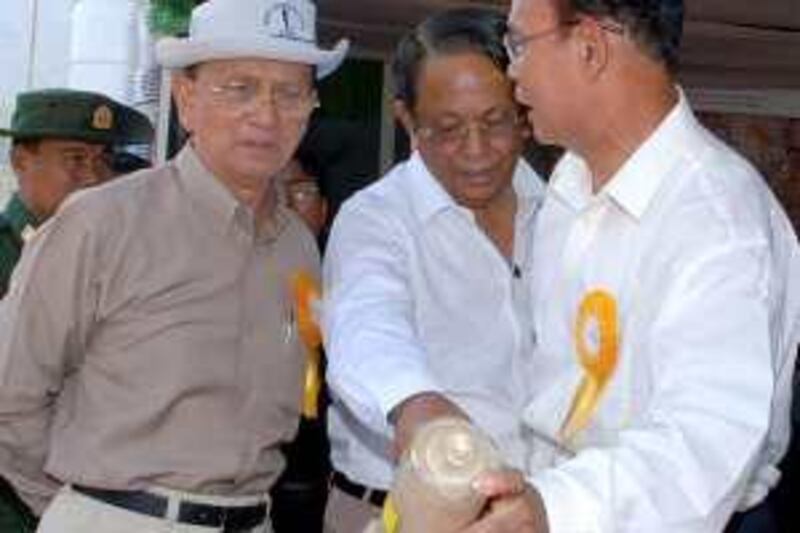BANGKOK // Myanmar's top general has warned against "saboteurs" conspiring to derail the country's polls later this year, as election campaigning appears to be starting amid international criticism over the continued detention of the opposition leader Aung San Suu Kyi. It follows the resignation last week of the prime minister Gen Thein Sein and more than 20 other ministers from their military posts in preparation to run in the forthcoming elections.
In a speech to mark May Day published in state-run media, Gen Shwe said "saboteurs from inside and outside the country" were attempting to "harm the election". "I would urge you all to ward off attempts of saboteurs and aliens to interfere and to sow seeds of mistrust in our country," he said. The country has been hit by a spate of deadly blasts as the junta prepares for its first election in two decades. "While the bomb blasts reveal simmering tensions, they are extremely unlikely to alter the regime's resolve to push ahead with the elections," said Richard Horsey, the former head of the International Labour Organisation in Myanmar and author of several recent reports on the forthcoming elections.
The prime minister and 27 other ministers registered a new party - the Union Solidarity Party - with the newly formed Election Commission on Thursday as they prepare to announce their candidacy as civilian politicians. The party is the new political wing of the mass pro-government community organisation, the Union Solidarity and Development Organisation (USDA), created by the junta supremo, Gen Than Shwe, more than 15 years ago to bolster support for the military regime.
The USDA's logo is a lion, and many observers believe the pro-junta politicians are keen to use this emblem as their political symbol. The ministers are not expected to resign their cabinet posts, but to use them as a base to campaign once electioneering is officially allowed, said a source close to the top generals. In fact the campaigning seems to have started already, according to many diplomats based in Rangoon. For several months now the state-controlled media have been full of reports and photographs of government ministers inaugurating community and development projects, shaking hands with local leaders and handing out financial assistance.
"Myanmar's election campaign has clearly started," said David Lipman, the EU Ambassador in Thailand, and a frequent visitor to Myanmar. "When I was there recently, government ministers were opening hospitals, schools, bridges and roads, obviously trying to win popular support for some candidates, especially in the ethnic areas I visited." Many in Myanmar's commercial centre Yangon remain sceptical and unmoved by the whole process.
"It won't change anything, we won't be allowed to vote freely," said Kyi Kyi Win, a young graphic design student in Yangon. "It's a selection not an election." "Burma is unique," said a 28-year-old teacher, Maung Maung Thein, referring to Myanmar by its old name. "We'll have a president, but a president with no power." Under the new constitution, adopted in a referendum two years ago that has been severely criticised by the international community as a sham, a newly created 440-member House of Representatives will have 330 elected civilians and 110 military representatives. The 14 provincial parliaments also have 25 per cent of the seats reserved for members of the military.
Those ministers who have resigned from their military positions will not be counted in this quota. Having additional seats on top filled by loyalists out of uniform will help ensure the army's continued power and influence over Myanmar's politics in the future. "Make no mistake, this election process is not about democracy, it is Gen Shwe's aim through these elections to civilianise the government, but not to hand over power to an elected civilian regime," said Dr Nay Win Maung, co-founder of the Yangon-based NGO, EGRESS and a newspaper proprietor.
This is one of the few things that analysts inside Myanmar and foreign experts seem to agree on. "The military wants to civilianise itself - as in 1974 - through the election process, but hold onto power indefinitely," said Prof David Steinberg, a Myanmar expert at George Washington University. "Many major generals and colonels have been brought to the capital for training in the past few months," said Win Min, a Myanmarese academic based in Chiang Mai in Thailand.
More than a thousand soldiers are currently enrolled in a school being run by the army chief, Gen Thura Shwe Man, he said. "They are being taught about parliamentary procedures and civilian matters in readiness for their new role as politicians." All political parties have until next Thursday to register with the Election Commission. More than 20 parties have already sought approval, although only a handful of pro-government parties have been registered so far.
The main opposition party, the National League for Democracy, which convincingly won the last elections but was never allowed to form a government, has refused to register because it regards the election laws as unfair and it would also mean expelling their leader, the detained Nobel Peace Laureate, Aung San Suu Kyi. For many activists and the international community this effectively makes sure the election process is neither credible nor inclusive. This is in fact what Gen Shwe wanted all along, according to some observers.
"The main aim of the junta's election laws is clearly to emasculate the NLD and prevent their leader Daw Aung San Suu Kyi from taking any part in the forthcoming electoral process," said the British Myanmar expert and biographer of the pro-democracy icon, Justin Wintle. Once the Electoral Commission has decided which parties will be given registration, only then will an election date will be announced. Most analysts expect it to take place in October or November. Until that announcement, campaigning is officially prohibited, though most political parties are already working behind the scenes to get ready for the polls.
@Email:foreign.desk@thenational.ae





